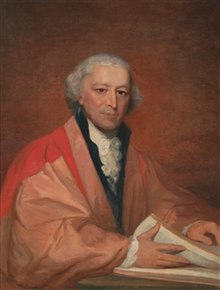William Samuel Johnson
| William Samuel Johnson | |
|---|---|
 |
|
|
United States Senator from Connecticut |
|
|
In office March 4, 1789 – March 4, 1791 |
|
| Preceded by | Office created |
| Succeeded by | Roger Sherman |
| Personal details | |
| Born | October 7, 1727 Stratford, Connecticut |
| Died | November 14, 1819 (aged 92) Stratford, Connecticut |
| Resting place | Christ Episcopal Church Cemetery, Stratford |
| Nationality | American |
| Political party | Pro-Administration |
| Spouse(s) | Anne Beach |
| Children | Elizabeth Johnson |
| Parents |
Samuel Johnson Charity Floyd Nicoll |
| Relatives | Daniel Verplanck (son-in-law) |
| Alma mater | Yale College |
| Profession | Politician, Clergyman |
| Military service | |
| Service/branch | Connecticut Colonial Militia |
| Rank | Colonel |
William Samuel Johnson (October 7, 1727 – November 14, 1819) was an early American statesman who was notable for signing the United States Constitution, for representing Connecticut in the United States Senate, and for serving as the third president of King's College.
William Samuel Johnson was born in Stratford, Connecticut, on October 7, 1727 to Samuel Johnson, a well-known Anglican clergyman and later president of King's (Columbia) College, and Johnson's first wife, Charity Floyd Nicoll. Johnson received his primary education at home. He then graduated from Yale College in 1744, going on to receive a master's degree from his alma mater in 1747 (as well as an honorary degree from Harvard the same year).
Although his father urged him to enter the clergy, Johnson decided instead to pursue a legal career. Self-educated in the law, he quickly developed an important clientele and established business connections extending beyond the boundaries of his native colony. He also held a commission in the Connecticut colonial militia for over 20 years, rising to the rank of colonel, and he served in the lower house of the Connecticut Legislature (1761 and 1765) and in the upper house (1766 and 1771–75). Additionally, he was a member of the colony's Supreme Court (1772–74).
He was first attracted to the Patriot cause by what he and his associates considered Parliament's unwarranted interference in the government of the colonies. He attended the Stamp Act Congress in 1765, and served on the committee that drafted an address to the King arguing the right of the colonies to decide tax policies for themselves. He opposed the Townshend Acts passed by Parliament in 1767 to pay for the French and Indian War and supported the non importation agreements devised by the colonies to protest taxation without representation.
...
Wikipedia
